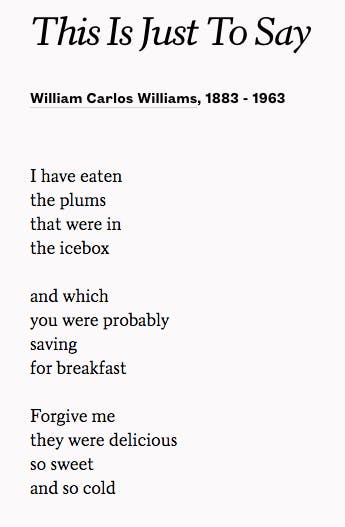Even readers unfamiliar with 20th century poetry will find something familiar about William Carlos Williams’ “This Is Just To Say,” first published in 1934. That’s in part because it takes the form of a decidedly domestic, dashed-off refrigerator note to a spouse, and also in part because it’s become part of the canon, endlessly reproduced and anthologized:
Twitter, meanwhile, with its strict character limit and formatting challenges, makes users hyperaware of poetic concerns that occupied Williams and others associated with Imagism—clarity and economy of language. So while some more irreverent Twitter poets have skewed toward jokes pinned on elementary rhyme schemes, others have turned to parodies of Williams’ work that trade on its ambiguous tone for faux profundity.
This is just to say
— Alexandra Erin | patreon.com/AlexandraErin (@AlexandraErin) October 29, 2016
I have opened
the investigation
that was closed in July
and which
you were probably
saving
for Clinton’s inauguration
this is just to say
— Brian Oliu (@BrianOliu) October 29, 2016
i have watched
all of the vines
that were on the twitter
forgive me
they were
this is just to say
i have watched
all o
I have eaten
— SI College Football (@si_ncaafb) October 15, 2016
the plums
that were in
the icebox
Forgive me
I needed a distraction
from Illinois
And Rutgers
A couple of line breaks, stanzas fashioned into similar compact shape, the barely intentional resistance to metrical prosody that gives the poem its unvarnished feel—taken together, it’s less a mockery of Williams than it is of Twitter itself, although Know Your Meme notes that the poem’s “spoofable qualities” were pointed out back in the 1960s and have been exploited ever since. Still, there’s no denying that Twitter provides an ideal platform for it: There’s even a bot that spits these out at regular intervals, distorting Williams’ recognizable kitchen into something wildly abstract.
I have eaten
— This Is Just Infinite (@JustToSayBot) October 31, 2016
the dictators
that were in
the expression
Forgive me
They were brassy
so crabby
and so paving
I have surprised
— This Is Just Infinite (@JustToSayBot) October 31, 2016
the inks
that were in
the burglar
Forgive me
They were stereo
so thin
and so strap
I have impaired
— This Is Just Infinite (@JustToSayBot) October 31, 2016
the heads
that were in
the tunnel
Forgive me
They were symbolic
so burnt
and so twice
Yet there’s something over and beyond the formal qualities of “This Is Just To Say” that make it so funny to play with. Perhaps it’s that Williams hasn’t actually apologized for eating the plums—he only asks for forgiveness. Could he have been some 80 years ahead of the #SorryNotSorry trend?
https://twitter.com/evepeyser/status/792476224027172864
Left my car for maybe 15 minutes in front of the dorms and I come back to this. College man pic.twitter.com/KlDx5BtXLX
— Hunter Jobbins (@jabbins) October 30, 2016
https://twitter.com/Esquiring/status/787748747547643905
and which
— Cookie Monster (@MeCookieMonster) September 21, 2016
you were probably
saving
for snack time
https://twitter.com/jdconnor/status/780609987689213952
Moreover, amid the pounding pulse of social media, there’s an overwhelming pressure to land one’s joke before someone else can make it. By continually referencing the Williams poem, one achieves a dual effect, emphasizing the internet’s anxiety of originality (and whatever drives people to comment “First!!” or “in b4 virals!!” on YouTube videos) while shamelessly recycling old, old material, thereby running it into the ground.
https://twitter.com/ThaJabberwock/status/775869683459235840
https://twitter.com/pilotbacon/status/773497169844273152
https://twitter.com/CarlMuckenhoupt/status/761221708887973888
This is just to say
— Moltz (@Moltz) October 28, 2016
I have not read the hot takes
Forgive me
They weren’t really that hot
And they were rather sour
You can have them
https://twitter.com/LukeMones/status/791654004430409728
With those contradictory forces at play—and an atypical interest in modernist art—it’s no surprise some observers are confused. But that, too, is in the very nature of poetry: It bewilders even as it explains.
Why is everybody re-writing WCW’s “This is just to say …” I feel like I’m missing something here pic.twitter.com/ZNf5L72VpR
— Dr Ellen Howley (@LN_howley) October 13, 2016
Well, Ellen, the truth is, there’s nothing to miss. People simply figured out an easy way to fuse two media that turned out to have a surprising amount in common, and they’re striving to make friends laugh in the process. Some of them are real poets, and some of them are pretending to be—but what’s the difference, really? The music of the word rings out regardless.
This is just to say:
I critically engaged
with a joke that’s
big on Twitter
at the moment
and which probably
nobody wanted
me to ruin like
I always do
Forgive me,
it was so obvious
so bloggable
and so dumb



